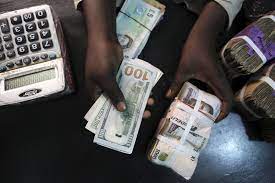The Central Bank of Nigeria (CBN) has made a big move by announcing the removal of operating licenses from 2,698 Bureau de Change (BDC) businesses.
Simultaneously, the apex bank published a list of approved dealers, bringing the total number of approved BDC dealers down to 2,991.
The CBN release titled ‘Approved BDCs’ indicated the revocation of licences from the 2,698 BDCs that were previously mentioned. This step followed a move taken by the CBN in 2022 that was quite similar to it. At that time, the CBN published a document detailing 5,689 licenced Bureaux De Change as of December 31, 2021.
Read also: CBN warns against international money transfer to Russia, Cameroun, others
BDCs’ importance in Nigeria’s economy
BDCs have been extremely important in Nigeria’s economy, particularly in terms of their impact on the country’s exchange rate. Their population increased dramatically over the course of the years, going from 74 in 2005 to 5,689 in 2021. However, under Emefiele’s direction, the industry experienced growth of more than one hundred percent. Subsequently, Emefiele instituted a prohibition on the sale of foreign currency to BDCs because of worries regarding round-tripping and involvement in unlawful financial activities.
During the time when Bola Tinubu was in office, the National Economy Subcommittee of the Policy Advisory Council Report made several recommendations for fundamental changes, one of which was to increase the minimum capitalization requirements for BDC operators. Allowing Nigerian banks to act as primary dealers in the process of supplying the foreign exchange market was yet another idea that was put forward by the council.
The Central Bank of Nigeria (CBN) began floating the naira in June, which resulted in a dramatic decline in the value of the currency. At the Investors’ and Exporters’ Foreign Exchange window, the value of the naira decreased to N795.28 per dollar. On the parallel market, where the situation is even more difficult, the naira finished the day at a rate of N820 to the dollar, N1095 to the British pound, and N905 to the Euro.
Recently, Aminu Gwadebe, who serves as the President of the Association of Bureau De Change Operators of Nigeria (ABCON), voiced his worry on the exclusion of BDCs from the I&E (Investors’ and Exporters’) window. Gwadebe emphasised that the instability of the naira continues to be a barrier to the economic expansion of Nigeria. While he did acknowledge that the I&E window had certain positive characteristics, he emphasised how important it was that the interests of BDCs be included in the policy execution of the window.
There is a high probability that the recent development of licence revocations and the exclusion of BDCs from the I&E window will have a significant impact on the foreign exchange market, further contributing to the volatility of that market.
About CBN
The CBN Act of 1958 set up the Central Bank of Nigeria as the country’s central bank and top monetary authority. It started running on July 1, 1959. The Central Bank of Nigeria (CBN) is run by Godwin Emefiele, who is called the Governor.
Central Bank of Nigeria wants to be proactive in making sure that Nigeria’s economy grows in a safe way. It does this by making sure that monetary and exchange rate policy and management of the financial sector are carried out in an effective, efficient, and clear way.By raising or lowering the bank rate as needed, the Central Bank controls the private banks.
The CBN’s goals are to keep prices and money stable, print legal tender currency in Nigeria, keep external reserves to protect the international worth of the legal tender currency, and help Nigeria build a strong financial system.
